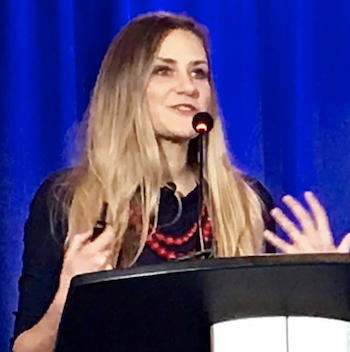
Bite Size DBT Skills:
Gathering Confidence and Momentum as a DBT Skills Expert with Ursula Whiteside, PhD
Training includes a 26 hour online course designed to provide a practical and effective approach for healthcare clinicians, peer-support staff and support staff working with patients experiencing mental health and substance-use struggles (including suicidal thoughts) in outpatient and inpatient settings - particularly in settings implementing the Zero Suicide approach. The course includes outside of class preparation and practice of techniques taught in course. The 14 one-hour “On-Demand” classes are intended to be delivered on an interval basis (e.g. monthly), and there are 12 hours of practice work outside of the online training hours. New classes are released every four weeks. Class Practice Assignments are to be submitted 1 week prior to the next class in the course. The Micro-Interventions Course as a pre-requisite.
Training Schedule & Course Description
There is an introduction (Course Orientation) and summary (Course Wrap-Up) class, in addition the following monthly DBT Skill classes (Skill of the Month). Each DBT Skill class is one hour and involves one hour of outside practice work. The structure for the skills relies on the Zero Suicide framework and it's elements.
- Opposite Action
- Cold Water
- Paced Breathing
- Mindfulness (Part 1)
- Distraction (combination of DBT skills)
- Mindfulness of Current Emotion
- DEAR MAN
- GIVE
- Mindfulness (Part 2)
- Problem Solving
- Radical Acceptance
- Building a Life Worth Living (combination of DBT skills and participants existing strengths)
Who Should Participate?
Healthcare providers in inpatient, outpatient and community health, including Nursing (RN, LPN, MA, CNA); Therapists (e.g., Marriage & Family Therapists, Mental Health Counselors, Psychologists, Psychiatrists, Social Workers); Providers (NP: ARNP or DNP, PA, MD, DO, ND), Peer Support Specialists, and other relevant health/behavioral health care staff.
Objectives
At the end of this course, participants will be able to:
- Identify, differentiate and teach 12 DBT Skills introduced in training
- Recall DBT Skill Tips and Roadblocks for each of 12 DBT skills
- Utilize 12 unique DBT Skill Stories (a social modeling technique) developed during course
- Apply DBT Skills to Safety Planning, Dialectics, and Linehan’s Biosocial Theory (Stress Model)
- Describe utilization of free NowMattersNow.org resource materials to support DBT Skills
- Relate skills to Micro-Interventions (Linking Statements, Do It Now, Caring Contacts) to improve delivery of DBT Skills
- Relate Skills to the Zero Suicide model and it’s seven elements
- Gather exposure to additional DBT Skills during the training
Completion Requirements
Participants are asked to attend the entire learning series and complete an evaluation with attendance attestation.
Continuing Education Credit (CME type)
Update Quarter 1, 2023: Currently pursuing CME credit options. Free certificate available.
For each Skill of the Month, you will complete a Survey (where you'll submit your Practice Assignment, take and Exam, and provide a Class Evaluation). After the Survey you'll have the option to purchase a Continuing Education Credit (free for specific counties or Tribal health systems). You do not need to purchase the CME, you can take the whole course for free and you'll get a 6 and a 12 month certificate for doing so.
What are CMEs?
Continuing education hours are required for many professions. Continuing Medical Education hours (or CMEs) are one type of continuing education hour. They have been certified to meet certain high standards in the field of healthcare.
While CME standards are specific to medical doctors and continuing education rules vary by state, other healthcare profession licensing bodies tend to accept CME hours because they have high quality controls. For example, in Washington State up to 50% of psychologists' required hours can be of the CME type.
This activity has been planned and implemented in accordance with the accreditation requirements and policies of the Wisconsin Medical Society through the joint providership of MetaStar, Inc. and Ursula Whiteside, LLC. MetaStar, Inc. is accredited by the Wisconsin Medical Society to provide continuing medical education for physicians.
MetaStar, Inc. designates this activity for a maximum of 26.00 AMA PRA Category 1 CreditsTM. Physicians should claim only the credit commensurate with the extent of their participation in the activity.
As of January 1, 2021 this online training will be available for CME credit for one year. The course is available indefinitely for non-CME credit.
Your Data
As part of this course:
- we will use email to communicate about course content (you have to "opt in" to "promotional emails" when you register).
- your course engagement data will be used to inform course improvements.
- your de-identified course engagement data may be used for research purposes (e.g. to evaluate the impact of the course)
Course Engagement Data Examples: surveys results, engagement and participation descriptives, and demographic information
Please use Google Chrome or Mozilla Firefox instead of Internet Explorer for best course experience. If you have trouble with progressing: install Google Chrome, restart your computer and your browser and log back in. If this doesn't work, try again the next day. This resolves 99.9% of challenges. See also FAQ below or here.
Important Note
This training involves a significant commitment of time. We have determined that those who complete our Micro-Interventions (click this link to register) course are best prepared to succeed in the course. Thus, Micro-Interventions is a requisite to this class. Once you complete Micro-Interventions, you will be automatically enrolled in Bite Size DBT skills during the first week of the following month.
Frequently Asked Questions
This course is closed for enrollment.
Course Curriculum
-
StartWelcome!
-
StartReference Materials
-
StartTechnology Notes
-
StartWhat Makes This Different
-
StartCourse Activities and Requirements
-
StartCourse Outline and Objectives*
-
StartWhat to Expect Each Month
-
StartSetting an Intention*
-
StartCreating a Plan*
-
StartDownloadables
-
StartOptional: Consultation Teams
-
StartRepetition and Mindfulness
-
StartCarry Forward Learning
-
StartCourse Foundationals
-
StartGrace*
-
StartFoundation of Bite Size DBT Skills
-
StartStress Model*
-
StartStress Model and Non-judgement*
-
StartStress Model on NowMattersNow.org*
-
StartWhat is a Safety Plan?
-
StartNowMattersNow.org Safety Plan*
-
StartOverlap of Stress Model and Safety Plan*
-
StartNowMattersNow.org Safety Plan Guide
-
StartDialectics*
-
StartZero Suicide & Recommended Standard Care
-
StartDiary Card*
Your Instructor

Dr. Ursula Whiteside is a licensed clinical psychologist, CEO of NowMattersNow.org and Clinical Faculty at the University of Washington. As a researcher, she has been awarded grants from the National Institute of Mental Health (NIMH) and the American Foundation for Suicide Prevention. NowMattersNow.org is a website she developed with colleagues that includes skills for managing suicidal thoughts based on Dialectical Behavior Therapy (DBT) and paired with Lived Experience stories.
Clinically, she began her training with Dr. Marsha Linehan in 1999 and later served as a DBT-adherent research therapist on a NIMH-funded clinical trial led by Dr. Linehan. Dr. Whiteside is a group and individual certified DBT clinician. Now, she treats high-risk suicidal clients in her small private practice in Seattle using DBT and caring contacts.
Dr. Whiteside is national faculty for the Zero Suicide initiative, a practical approach to suicide prevention in health care and behavioral healthcare systems. This program was recently described by NPR on a segment titled “What Happens If You Try to Prevent Every Single Suicide?” Dr. Whiteside serves on the faculty of the National Action Alliance Zero Suicide Academy. She is also a founding board member of United Suicide Survivors International.
As a person with Lived Experience, she strives to decrease the gap between "us and them" and to ensure that the voices of those who have been there are included in all relevant conversations: nothing about us without us.
